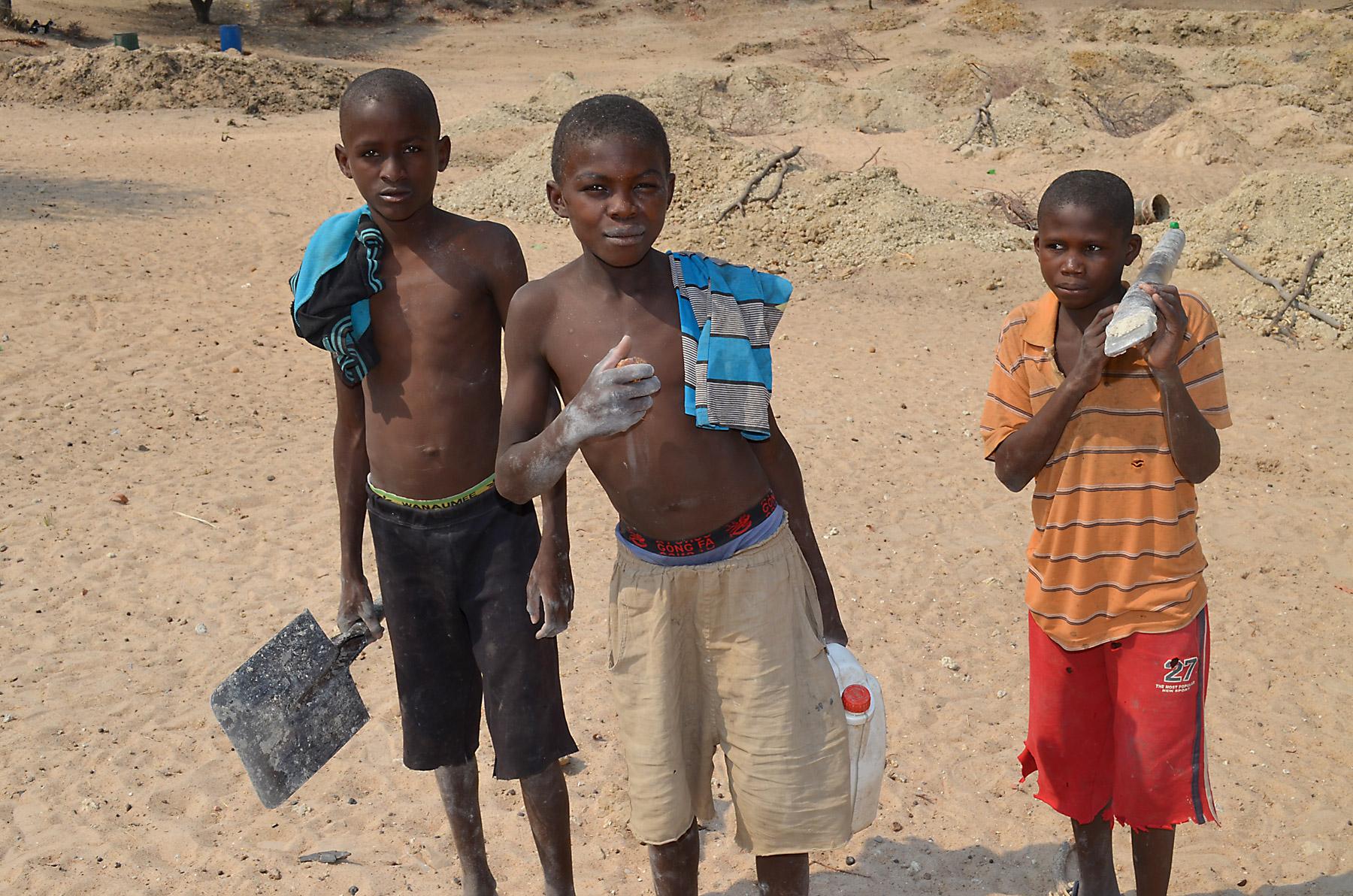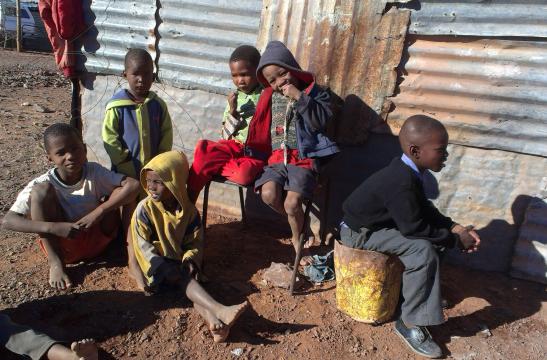Hope amid Pain in Drought-Hit Angolan Regions

Young boys look for water in southern Angola. Photo: Nzakumiena Daniel
Bishop Ndwanapo Expresses Gratitude for Lutheran Communion Assistance
(LWI) – In Angola’s southern province of Cunene, Lutheran congregations in the rural community of Chavikwa “are closing down, and the pastor is moving out because the people have left and he cannot stay there by himself. These are small congregations without much sustainability, and most of their workers are volunteers supported by the local people. [What to do] if the people are no longer there, no rains and nothing to eat?”
This is how Bishop Tomás Ndawanapo of the Evangelical Lutheran Church of Angola (IELA) describes the impact of a severe drought in Angola that is becoming unbearable for subsistence farmers and cattle herders especially in the five southern provinces that also include Namibe, Kuando Kubango, Benguela and Huila. More than 1.6 million people are directly affected by the prolonged food and water crisis.
In Onepole, one of the driest places in Cunene, with no rainfall recorded for three consecutive years, “there is nothing,” Ndawanapo says. “Herders and their animals are moving out towards Onjiva town, which is already a very far distance by walking,” he adds.
The Southern African country, with a population of 21 million people, has been experiencing a prolonged dry spell since 2012. Cunene, neighboring equally drought-stricken Namibia, is the most adversely affected region with nearly 600,000 people—half of its population—facing a food and water crisis including lack of pastures for animals.
The little rains anticipated in November are not expected to provide much relief, says the Lutheran bishop. “Maybe we will get more rain in January to March. But still farmers will need to plant short-term grains because getting rains for three months only will not be enough for normal crops to mature,” he adds.
Reaching Out to Vulnerable Families
Still, there is hope. Response to a drought appeal by The Lutheran World Federation (LWF) and partners in the ACT Alliance has brought relief to thousands of vulnerable families, who are currently receiving basic food stuffs—mealie-meal, beans, cooking oil and salt. The distribution coordinated by the LWF Department for World Service (DWS) country program in Angola and IELA will continue until early next year when some harvest is expected. During the most critical periods of the drought 6,000 people are targeted including women and orphaned children.
Ndawanapo recently hosted a delegation of Lutheran leaders visiting Angola and Namibia led by LWF General Secretary Rev. Martin Junge. The group including LWF Vice-President for Africa; Presiding Bishop Dr Alex G. Malasusa (Tanzania); DWS director, Rev. Eberhard Hitzler; and LWF area secretary for Africa, Rev. Dr Elieshi Mungure visited communities in Cunene province and local partners collaborating with LWF and ACT in supporting rural communities affected by the crisis. Other Lutheran communion leaders visiting the drought-hit countries included Ms Colleen Cunningham (South Africa) and Bishop Dr Frank O. July (Germany).
“Your coming to Angola was, is and will be historical. It is an active living testimony of our communion and our Christian commitment to the proclamation of the gospel and assistance to those who suffer,” Ndawanapo said of the September visit.
He gave the example of an LWF-donated truck which recently delivered 32,000 liters of clean drinking water to the rural community in Onepole, bringing a measure of relief to more than 500 people there.
Still, the shortage of food and water persists in many other areas and coping mechanisms have been weakened, leaving the population fragile. “Youth are migrating to the cities to search for work to support their families, teachers are abandoning schools, children are absent from school or leaving early and those who remain in the region often must walk up to 15 kilometers to obtain water,” an LWF/ACT Alliance report states.
The report points out that the government’s response to the emergency is not showing any tangible indications and the poverty level in the affected communities is still endemic, despite the country’s economic growth. “Families are eating one meal a day, which consists of maize meal or millet, or go without a meal.”
Poor sanitation is a concern, there are reports of health problems including cholera, artificial dams or “chimpaka” have dried up and families are attempting to dig wells themselves to get water. More vulnerable households have fallen into poverty and are turning to alcohol abuse because it is accessible and affordable, the report adds.
Lutheran Communion Solidarity
The LWF delegation assured the affected communities of the Lutheran communion’s solidarity with the Angolan people and churches as they seek ways of coping with drought. “In Onepole, the community was able to talk about their difficulties and by doing so, regained some hope for their future,” said Malasusa, Presiding Bishop of the Evangelical Lutheran Church in Tanzania.
“I want the people in the affected areas to know that they are not alone and that we as the LWF are committed to help. Their thirst is our thirst, and their hunger, our hunger,” the LWF vice-president remarked.
He emphasized the need to work towards long-term solutions such as drilling bore holes for water and reforestation so that resilience can be developed for communities that are prone to drought and other disasters. “We heard that this was not the first time that drought had hit the area. There have been three years of drought in a row already,” he emphasized
Advocacy with the government is also crucial, the LWF vice-president noted, and encouraged IELA and other churches in Angola to strengthen partnerships in this area. “Mothers and children are the most vulnerable section of the suffering population and it is important that the government responds to this through own programs and budgets,” Malasusa added.
LWF general secretary Junge said he had witnessed moments of both pain and hope during his meetings with community members, pastors and local authority leaders in Angola. “Seeing young boys digging wells using their hands—this was a very painful moment. Yet, I also saw community leaders pulling together their determination and resources to tackle the difficult situation. That the church is present, wanting to be with people who are suffering and reaching out to offer support was a real blessing,” Junge added.
The DWS program has been operational in Angola since 1986, with its regular work focusing on supporting rural communities to build sustainable livelihoods and enhance food security.
IELA has 48,000 members, and it joined the LWF in 1997.


